Samsung Galaxy Nexus & Ice Cream Sandwich Review
by Brian Klug & Anand Lal Shimpi on January 18, 2012 1:34 PM ESTWiFi
The Galaxy Nexus uses Broadcom’s BCM4330, which is starting to pick up steam and become just as ubiquitous as the BCM4329 it replaced. The Galaxy Nexus’ BCM4330 includes both 2.4 and 5 GHz WLAN connectivity, just like the SGS2 in fact. What’s particularly notable is that Android 4.0.x now includes the proper prioritization for each WiFi band, and also includes the ability to set preference for one band for the other. By default, when faced with the same SSID on both 2.4 and 5 GHz, the Galaxy Nexus correctly chooses the 5 GHz AP if the signal is favorable, then falls over to 2.4 GHz when its link quality on that band would be better. Other than this notable change, the remainder of the WiFi settings panes are unchanged. The WiFi sleep preferences and the main scan and connect page does get a minor facelift and change, however.
The Galaxy Nexus latched onto my 802.11n APs on both 2.4 and 5 GHz and used 20 MHz long guard interval rates at 65 Mbps the same as other BCM4330 based devices. Throughput is unsurprisingly very good on the Galaxy Nexus in our WiFi test, which consists of downloading a 100 MB PDF hosted locally over WiFi. Of course, since we can now control and choose which band the device uses, I tested on both 2.4 GHz and 5 GHz, both with a negotiated link rate of 65 Mbps.
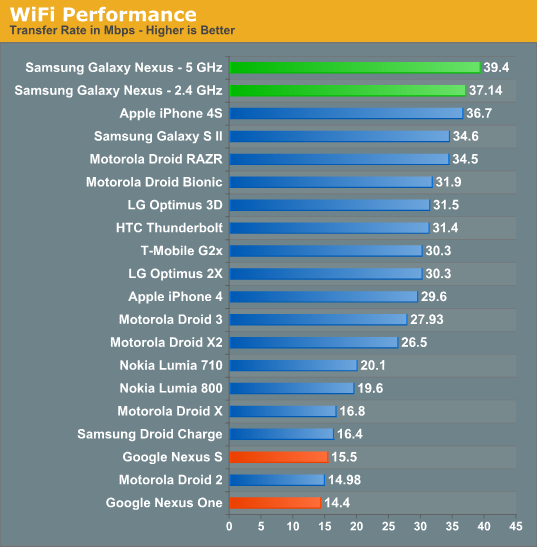
WiFi range on the Galaxy Nexus is good as well, I can make it to the same place before hopping off my network as other devices. I have gotten a few emails and read reports about power-save mode incompatibility with some APs that causes it to drop off when on standby mode. Since we've seen BCM4330 work just fine on other devices, I have no doubt this is a software issue which will be fixed soon.
Speakerphone
As usual I also measured speakerphone volume on both variants of the Galaxy Nexus using a sound datalogger. There is apparently a difference between the two models, possibly from different acoustical chambers in the vibration unit and antenna. Also there’s possibly still a difference as a result of the different voice coders in use, and the different dynamic range.
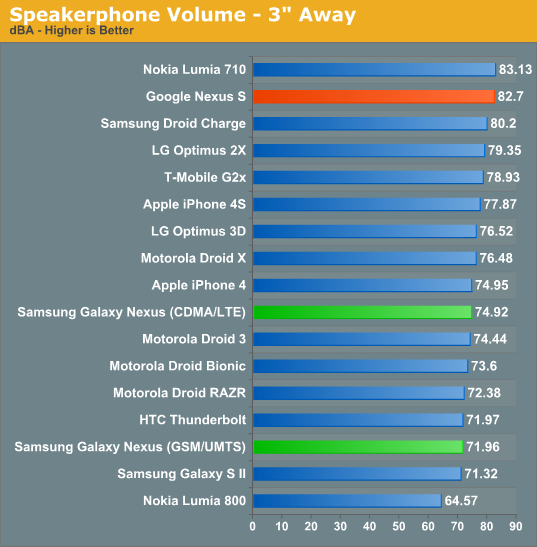
Either way, the two test differently, and subjectively my experience backs those measurements up. I found the GSM/UMTS Galaxy Nexus a bit too quiet while using Google Navigation, and the CDMA/LTE Galaxy Nexus on the quieter side but totally useable for Navigation.
GPS
Just like the SGS2, the Galaxy Nexus uses a SiRFStarIV GSD4t for GPS. Subjectively the Galaxy Nexus GPS doesn’t lock quite as fast as some of the other GNSS solutions that are integrated into the cellular basebands in phones, but it does get the job done pretty fast. I see a time to first fix of between 4-7 seconds depending on visible sky swath presented to the handset.
I did receive a few emails from readers with reports of some Galaxy Nexuses shipping with GPS issues or taking too long to lock. One of my friends with a CDMA/LTE Galaxy Nexus also reported that he couldn’t get a GPS lock at all for Google Navigation. I’m not entirely sure what the deal is here since I never was able to encounter this behavior, although manually downloading the A-GPS data (ephemeris) using a tool like GPS Status seems to in general helps mitigate those problems when they do happen. This just manually re-downloads the xtra.bin file from http://xtra1.gpsonextra.net/xtra.bin as configured in gps.conf. I have to admit that I didn’t encounter any GPS issues in my time with the Google Nexus (CDMA/LTE or GSM/UMTS version) so far.
Audio
We’re going to do a more in-depth audio analysis with the Galaxy Nexus when we have our testing suite more fleshed out, and possibly bring you Francois Simond’s thoughts once more. For now however, we have some RMAA runs I talked about a while ago in another review, and my own impressions with Galaxy Nexus sound after using the device for a while now as my primary music player with some Shure SE535s.
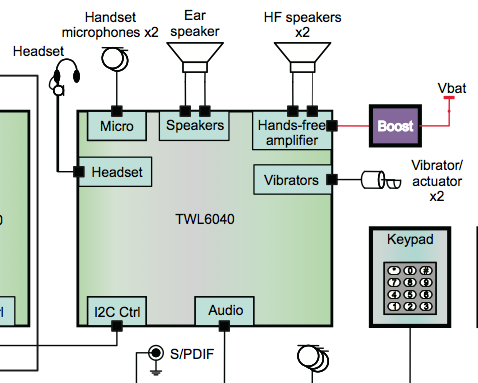
First off, the Galaxy Nexus out of the box is pretty decent subjectively. The Galaxy Nexus uses TI’s TWL6040 low power audio codec for its DAC and other audio responsibilities, alongside the vibrator actuator. We’ve seen some other TI audio codecs (like AIC3254 in the HTC Sensation) but this our first time seeing TWL6040. Almost immediately I noticed that there isn’t any constant high frequency whine present like I’ve heard on so many phones lately (Bionic, SGS2, others), and it’s hard to hear any noise when the DAC turns on and off after music stops playing. Even plugged into USB power, the device also doesn’t pick up any more noise or change at all. There’s also almost no CPU noise, though if you listen very carefully you can indeed hear some state changes, but it’s very minimal and very difficult to pick out.
Though the frequency response isn’t entirely flat as shown, the Galaxy Nexus doesn’t sound bad subjectively. Our testing here is just a RMAA run from line out on the devices to line in on an ASUS Xonar Xense sound card. In addition, testing is done at 44100/16 bit on the devices - Android will downsample anything more than this.

From 20 Hz to 20 kHz: +0.10, -0.62 (dB)
Noise on the Galaxy Nexus also isn’t bad, definitely better than the RAZR we tested earlier.
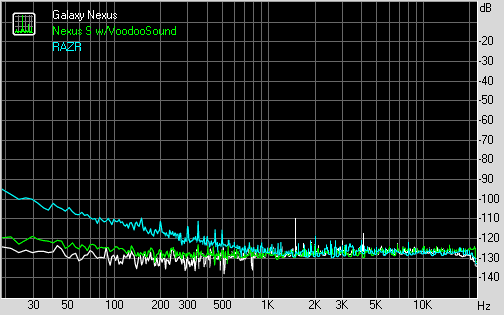
Noise Level: -96.2 (dB, A weight)
Dynamic range shows the difference in level between the maximum output and minimum output on the smartphone. This is limited by voltage swing and system noise. Galaxy Nexus again here looks pretty good, minus a few spikes.

Dynamic range: 96.0 (dB, A weight)
The two total harmonic distortion charts are next, which are the summation of integer multiples of the test frequency and expressed as a ratio of the input signal (in this case at 1 kHz). THD+Noise gives all frequencies except the input signal. The Galaxy Nexus is pretty good here, but still has some spikes at a few noteworthy integer multiples, plus some odd spikes at high frequencies.
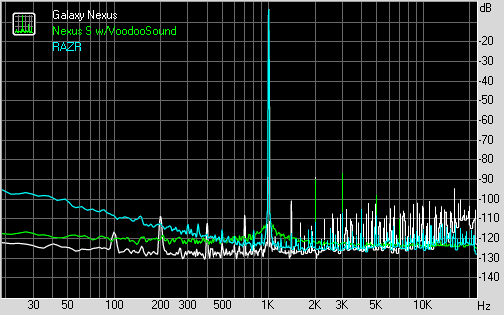
THD %: 0.0088
Intermodulation distortion is similar to total harmonic distortion, however it applies two input signals and then measures the signal at all frequencies except the two inputs. In this case, the two signals are on opposite sides of the spectrum. Galaxy Nexus ends up not looking too bad here although there are disconcerting spikes above 1 kHz that I can’t explain.
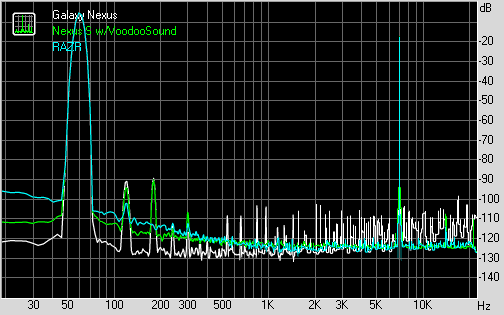
IMD + Noise %: 0.013
Finally stereo crosstalk is pretty flat on the Galaxy Nexus.

Stereo Crosstalk: -87.4 dB
Again, this isn’t meant to be a totally comprehensive analysis of the Galaxy Nexus’ sound characteristics, just some educated impressions. Subjectively the Galaxy Nexus sounds nice and clean, and is absent of the annoyingly audible background noise and whine that’s present on some of the other noteworthy phones we’ve tried as of late. Francois (supercurio) has expressed a few times that the Galaxy Nexus has good audio potential, and that alone should tell you something.


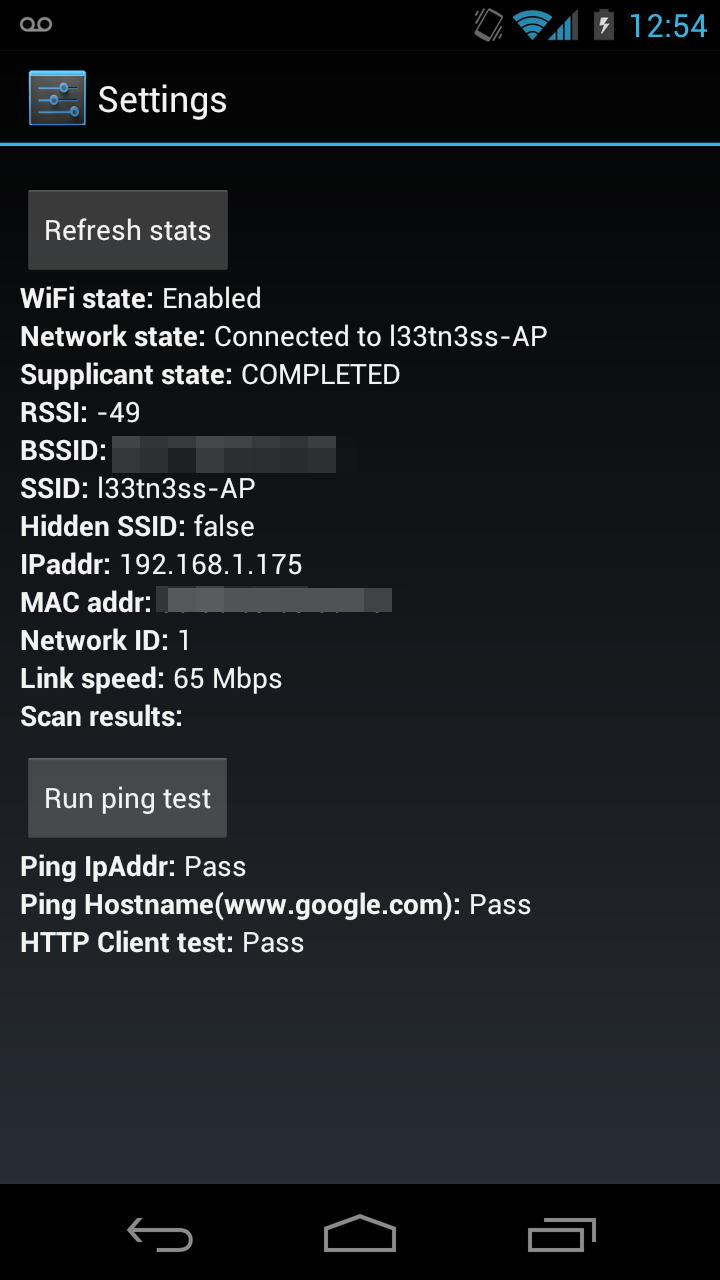
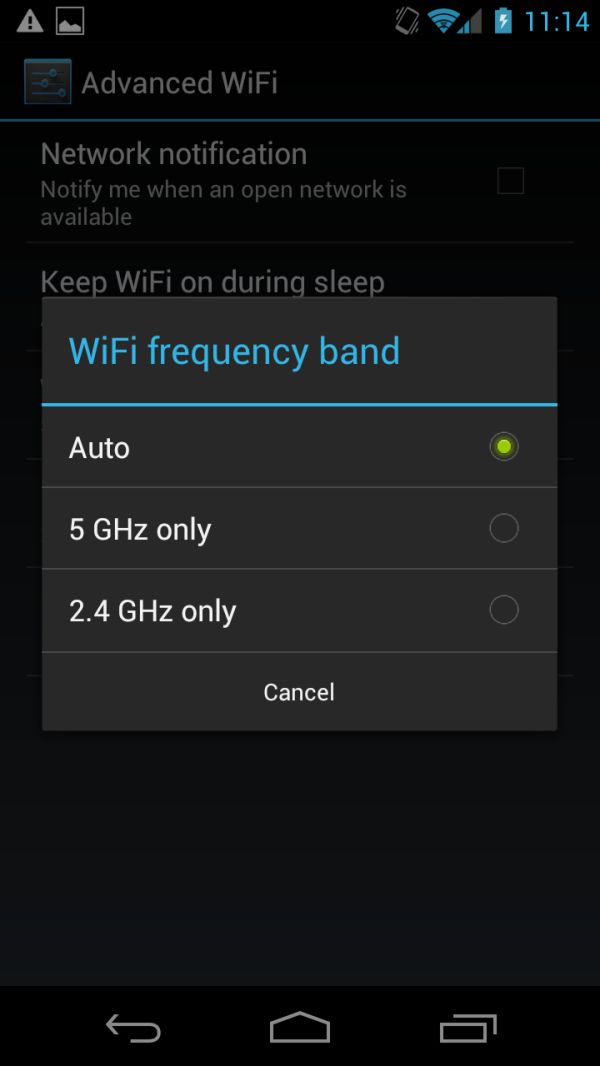
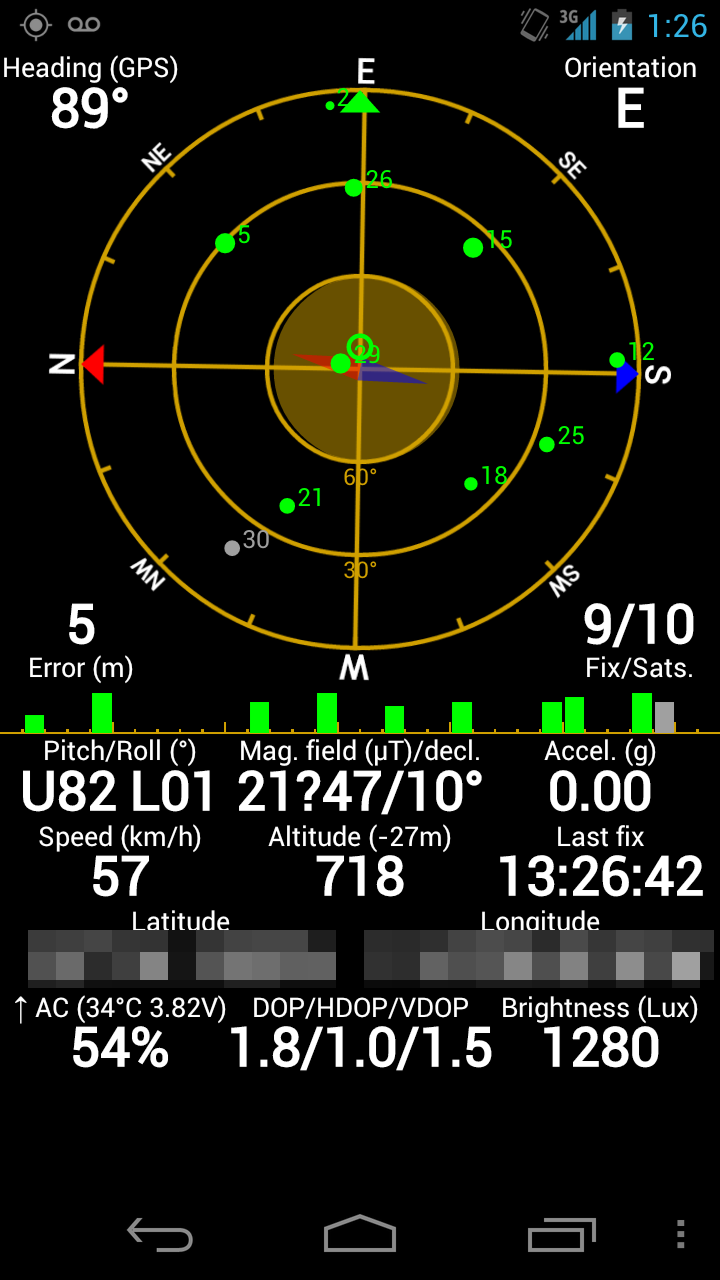








185 Comments
View All Comments
sjankis630 - Wednesday, January 25, 2012 - link
I can comment that my Galaxy Nexus' black is as black as midnight to a blind man.The only time I see some grey type tones is when the website is colored that way.
walkman - Sunday, January 22, 2012 - link
That was a shocking detailed and informative review -- It's the sort of article that makes Anandtech my first choice for tech reviews.- The article mentioned new processors just around the corner. Was this referring to any processors other than Krait? I haven't heard any news about Krait since November PR -- Are we looking at April or June? And do we think anyone besides HTC will use Krait?
Omid.M - Sunday, January 22, 2012 - link
Processors around the corner:Krait
Tegra3
OMAP5
Exynos 5250
It's going to be a bloodbath for the next 12-18 months.
If iPhone 5 uses the MDM9160 (?) modem with LTE, I'm jumping on that. Tired of tweaking battery life on my Thunderbolt. Not sure I want to do the same with a Galaxy Nexus LTE.
And what's this I'm reading about connection issues / dropped calls on the VZW Nexus? Ridiculous.
Rictorhell - Monday, January 23, 2012 - link
I am a big fan of this site and I read the reviews and articles all of the time and I find them very informative and useful, but, I have a request.When a review is written, particularly about a certain smartphone or tablet, it is mentioned whether the device has an SD card slot and you always tend to differentiate between whether it is a “full-sized” SD slot or a “micro”SD slot. That is useful to know, but there are several actual types of SD cards available, each with a different maximum storage capacity, and you don't specify in your reviews which types of SD cards are actually supported by the device being reviewed and I think that is a bit of an oversight.
To the best of my knowledge, standard SD cards only have a maximum capacity of up to 2gb, while SDHC cards can go up to as high as 32gb, and SDXC cards, while only available right now in sizes up to 128gb, are supposed to theoretically be able to be manufactured in sizes up to 2tb.
There is a huge difference in size between 2gb, 32gb, and 128gb. Given that smartphones and tablets have substantial built in limits as far as storage capacity, I think it would be very helpful to know which type of SD card is supported by which device, if that is possible.
If I read two reviews about two different Android tablets and both reviews mention that both cards have a full-size SD card slot, as a user with a lot of media files, I'm going to be interested to know if one of those tablets can support SDXC cards while the other one cannot.
I consider that to be a major feature, to me, just as important as battery life. If you do reviews of tablets and smartphones, or even ultrabooks, and neglect to specify how much storage potential these devices have or do not have, you are making it very easy for the hardware manufacturers to simply put in second rate storage and format support, knowing that it will not be covered in reviews by sites like Anandech. Not only is this going to stunt the evolution of these devices but it's also going to mean less options for consumers.
Anyway, thank you for your time.
peevee - Tuesday, January 24, 2012 - link
Anand, please include OS version number (and carrier when applies) in the charts for performance and battery life tests. They make huge difference, as browser speeds improve, they consume less CPU time and less energy when browsing.For example, the discrepancy between iPhone 4 and iPhone 4S looks outsized and probably is the result of testing iPhone 4 with iOS much older than the current version, probably not even 4.3, and 4S with iOS 5.
skinien - Tuesday, January 24, 2012 - link
What a review!!! I'm not in the market for a new hone right now, but when the time comes, I'll be looking here for a review on prospective phones. GREAT WRITE UP!sonicmerlin - Thursday, January 26, 2012 - link
I'm sorry, but you're ignoring the fact that ICS STILL lags. If you load up a heavy site like theverge, try scrolling around while the site is loading. Your entire page stutters and freezes until everything is done loading. ICS also lags more as you load more apps onto your phone, just like all previous versions of Android. Also notice how all UI elements are flattened when pages are rendered. Try zooming in or out. The new page info appears all at once, rather than pop up individually as in iOS and WP7. This can result in lag on heavy sites.For whatever reason tech "nerds" don't seem to notice the very obvious fluidity issues. Yes once you've loaded up a site it's easy to pan around, but people don't sit there patiently waiting for websites to load. Nor do they appreciate the frequent microstutters due to garbage collection issues, or the massive standby battery drain issues that tons of Android phones experience. And even the basic phone UI itself still lags behind your finger, demonstrating an irritating rubberband affect.
It's stupid. Android will never stop lagging until Google rewrites the OS to give the UI thread priority, instead of putting it at the same level as app priority.
rupert3k - Friday, January 27, 2012 - link
Learned loads from reading this, really impressed with how far Android has come.The stuttering when scrolling, zooming or browsing always annoyed me, stoked to learn ICS is fully accelerated.
One wonders if we'll see any Motorola Nexus style devices once Google settles into their new ownership. Be nice to see a Motorola this nice!
Hope we see high dot pitch Android devices to combat Retina, not happy with AMOLED at present it seems a bit yellowy & over saturated to me, surely LG or Samsung can also spec Retina style IPS or at least offer the choice between AMOLED & IPS 330dpi.
Bring on the Quad high DPI Android & iOS tablets!!
bruce3777a - Sunday, January 29, 2012 - link
Hi,Please bear with me:)
If a phone was upgraded from Gingerbread to ICS and It appears to be able to still work with the apps from many banks
It seems like these apps were not compatable with tablets running honeycomb so it was necessary to just use the browser.
If a tablet is upgraded from Honeycomb to ICS, or if a new tablet is purchased that has ICS would/should that automatically make it compatable, or is there still something that the banks would need to do to make it universal to both phones and tablets that use ICS. Thanks in advance for any insight.
Lucian Armasu - Monday, January 30, 2012 - link
I think I figured it out. I just saw this:http://score.nena.se/nenamark/view?version=2&d...
And I remembered it's not the only time I see 1196x720 pixels being rendered in a benchmark. Anand, if you're reading this, could it be because the buttons are NOT rendered by the GPU, and instead are rendered by those Cortex-M3 2D cores? They would have to render much fewer pixels, but they are also much slower than the GPU, and also pretty old tech I think.